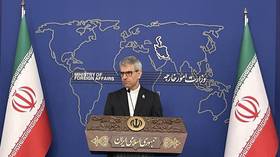‘Cameron wants to kick EU exit issue into long grass’ – UKIP leader
Despite the British government’s desire to soft-pedal the country’s possible EU exit, the referendum to decide UK’s future in the Union must be held before the 2015 general election, believes the leader of the UK Independence Party, Nigel Farage.
With a lot of hard feeling swirling around the EU, one thing
many seem agreed on is anger at Brussels. Nine European countries
are now in recession and, with no end to austerity in sight, EU
membership appears to be more trouble than its worth for some.
The leader of the Euroskeptical UKIP party, Nigel Farage, says
recent research show that by participating in the EU, Britain is
annually losing more than £100 billion due to membership fees and
the Union’s regulations.
RT: Support for your cause is growing, and as our Berlin
correspondent reported, the UK's EU cousins don't mind Britain
leaving. So who wants the UK to stay?
Nigel Farage: Germany wants the UK to stay – because Germany
thinks that if the UK leaves the whole thing will unravel. And if
it unravels, including the Eurozone, than the Germans will have
some very big losses. And also, you know, the Germans are the ones
that have benefited out of the Eurozone. Most of their growth over
the last four, five or six years has been to the cost of other
Eurozone countries. So the Germans – very very keen to keep Britain
in.
RT: There are repeated warnings that foreign investors
are being put off by the uncertainty. Does Britain fully understand
the possible ramifications of the exit from the EU?
NF: Well, what would’ve been really damaging to the UK is if
we’d been stupid enough to join the Eurozone. Thank goodness, we
said ‘no.’ Otherwise we’d in a similar state to many of the
Mediterranean countries today. That was the first big good decision
that we’ve made. Now I do understand the argument about
uncertainty, even though I very much take the view that trade would
go on between Britain and the rest of Europe completely unaffected
by us leaving the political union. After all, the European
countries sell far more goods to us than we do to them. But I do
understand that anything where you’re told there could be a
four-and-a-half, perhaps a five-year debate on the subject could
lead to uncertainty. All of which really reinforces my view that
what [British PM, David] Cameron has done here is to attempt to
kick this issue off into the long grass. And really we’ve got a
have a referendum to sort this issue before the next general
election.
RT: Instead of keeping one hand on the exit, why aren't
Euro MPs like yourself taking more advantage of trying to change
things from within Brussels?
NF: Oh, goodness me, if we try to reform this thing from
within I’d need to live to 300 to have much chance. Listen, the
interesting thing is that in response to the Eurozone crisis really
almost everybody inside the EU – rather than saying let’s reform
things, let’s change things, let’s accept this model isn’t really
working – they’ve done the opposite. They’re saying: ‘Oh, goodness
me, we must have more Europe, more integration, we must take yet
more democracy away from member states. Nobody, but nobody, inside
these institutions is talking about reform in the same terms as the
UK debate and Mr Cameron are. They are two completely different
things.
RT: Britain's membership is estimated to be
worth between £31 and 92 billion pounds per year in income gains
according to business leaders – what would that be replaced
with?
NF: There are some business figures, many of whom have already
got knighthoods or peerages, worth noting that and people, who are
heads of giant multinational companies. And they’ve got businesses
in Europe, and they’ve also got big businesses in Europe. And I can
see the argument that if you’re multinational the EU way of making
law is to your benefit because it puts out of business all of your
small and medium-size competitors. So, I understand that. But the
idea that because we’re members of the political union, because
we’ve surrendered our democracy means that other countries in
Europe will do business with us is nonsense. We do business all
over the world without being in a political union with anybody
else. And far from it being a big benefit to the British economy
there are many other people – right through from the Institute of
Directors, through some recent analysis from professor Tim Compton,
one of the government’s former wise men, saying actually this is
costing us, some say, more than £100 billion per year to be in,
with membership fees and the regulation, which the British
government would never ever choose.
The statements, views and opinions expressed in this column are solely those of the author and do not necessarily represent those of RT.












